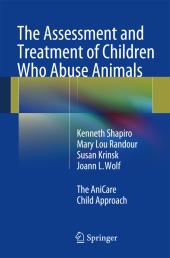 Neuerscheinungen 2013Stand: 2020-01-07 |
Schnellsuche
ISBN/Stichwort/Autor
|
Herderstraße 10
10625 Berlin
Tel.: 030 315 714 16
Fax 030 315 714 14
info@buchspektrum.de |

Susan Krinsk, Mary Lou Randour, Kenneth Shapiro
(Beteiligte)
The Assessment and Treatment of Children Who Abuse Animals
The AniCare Child Approach
2013. xii, 124 S. 10 SW-Abb. 235 mm
Verlag/Jahr: SPRINGER, BERLIN 2013
ISBN: 3-319-01088-3 (3319010883)
Neue ISBN: 978-3-319-01088-5 (9783319010885)
Preis und Lieferzeit: Bitte klicken
Empirical research has clearly demonstrated that animal abuse in childhood is associated with family violence and violent behavior towards humans in general. Such abuse is accordingly of increasing interest within human services and the criminal justice system.
This handbook will serve as an ideal resource for therapists in social work, psychology, psychiatry, and allied fields who work with children who have abused animals. It provides step-by-step guidance on how to assess, develop appropriate treatment plans for, and treat children who commit animal abuse, based on the AniCare model developed by the Animals and Society Institute. Exercises cover the identification and expression of feelings, the development of empathy, self-management skills, and working with parents. Careful consideration is also paid to the effects of witnessing animal abuse. The theoretical framework is eclectic, encompassing cognitive behavioral, psychodynamic, and attachment theories. A number of illustrative case studies are included, along with excerpts from treatment sessions. Accompanying electronic supplementary material demonstrates role-played assessment and treatment and includes workshop presentations of pedagogic material.
Context: Animal Abuse and Family Violence.- The Prevalence of Juvenile Animal Abuse.- Changing Attitudes Toward Animal Abuse. Theory: Attachment Theory.- Cognitive Behaviorism and Trauma-informed Narrative.- Psychodynamic Theory.- Assessment.- Diagnostic Categories Associated with Children Who Commit Animal Abuse.- Attention-Deficit and Disruptive Behavior Disorders.- Attachment Difficulties. Treatment.- Processing Therapist Reactions.- Joining the Client.- Framing the Therapy.- Animal-assisted Therapy.- Empathy.- Clinical Cases.- Empathy Development: Psychosocial Emotional Exercises.- Puppet Role-play.- Self-Management.- Working with Parents Behavior-Based Parent Training Tools.- Behavioral Techniques Used for.- Treating Aggressive Youth.- Relationships and Family Processes.- Building the Therapeutic Alliance.
From the reviews:
The Assessment and Treatment of Children Who Abuse Animals: The AniCare Child Approach is a slim volume most appropriate for mental health professionals working with children and families in private and institutional settings. It can also inform law enforcement and educational professionals about the nature and causes of animal abuse in children. The theoretical sections are helpful for graduate students or new professionals who are not familiar with children exhibiting these behaviors. (Tasha R. Howe, PsycCRITIQUES, Vol. 59 (21), 2014)


